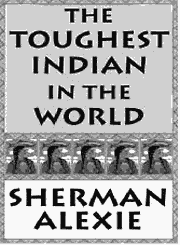DON’T BE SURPRISED if Sherman Alexie wins a MacArthur grant someday soon; at the ripe old age of 33 he has won every major literary prize, he’s been anointed by The New Yorker and Granta as one of the Best Young Writers in the Universe, and he’s generally caused a ruckus on multicultural book-convention panels from here to Mars.
The Toughest Indian in the World
by Sherman Alexie (Atlantic Monthly, $24)
The reason Alexie has met with such success is because 1) his prose is haunting and overpowering, and 2) he is writing about the “Native American experience” at a cultural moment when these experiences go for a premium. Finding himself in the spotlight, Alexie has famously and consistently flouted expectations about what is “Indian.” His characters are not peaceful medicine men ࠬa Louise Erdrich; rather they are drunks, liars, guys with enormous chips on their shoulders, women who have betrayed themselves in various ways in an attempt to dodge the sadness at the heart of their tortured history.
His latest offering is the story collection The Toughest Indian in the World, and it proves once again that he’s the real deal: a master stylist, a born storyteller as well as a writer of inspired formal innovations and experiments. Alexie pushes the edges between poetry and prose, turning his characters into ghosts just as you begin to believe they’re flesh and blood. “South by Southwest” concerns Seymour and Salmon Boy, two down-and-out friends who rob an IHOP and set off on a “nonviolent killing spree” across the Southwest.
Their surreal journey takes them to a farmhouse where an old lady sits them down at her kitchen table and talks in half-sentences about her dead husband. After that they hold up a tourist family:
Here here, said the father, you can have all my money. I don’t want your money, said Seymour, I want to know how you met, how you fell in love. But that’s our story, said the father, you can’t steal it.
Who owns the story of the past? How do you know when you have drifted so far from the past that the stories don’t belong to you anymore? These questions simmer beneath the surface of Alexie’s work. In “Class,” the Indian narrator marries a white woman, lands a cushy job, and drives around in a nice car. One night when he is depressed and at the end of everything, he goes into a bar called Chuck’s, where Indians hang out. A drunk named Junior, who “looked like Chief Broom from One Flew Over the Cuckoo’s Nest,” ends up beating him up, knocking him out “with a left uppercut that carried with it the moon and half of every star in the universe.”
This pathetic and needy protagonist is a shining example of the wrong way to be Indian in Alexie’s world. To attempt to assimilate, to move between two worlds, is to dilute the blood and endanger the tribe.
RECENTLY IN Salon magazine Jonathan Miles called this Alexie’s “cultural imperialism.” Miles was scolding Alexie for a review he wrote in the LA Times—a virulent trashing of Ian Frazier’s On the Rez, wherein a white New Yorker tried to tell the story of the Oglala Sioux. Alexie portrays Frazier as the worst kind of white-man romantic: venturing into the reservation like a scientist, moving among the Oglala without ever considering that perhaps the skin itself creates a kind of uncrossable barrier, a wall stronger than any reservation boundary.
Miles criticizes Alexie for an attitude that would leave “a culture’s stories firmly and exclusively in the hands of its own tellers.” He gets in some pretty good digs along the way—and the aggression and virulence of the whole exchange is of a piece with Alexie’s macho persona, his longing for a world where Indians were Indians, men were men, and women were women. Make no mistake, you Salon– reading whitey, assimilation is for wimps.
Which brings one to the ultimate irony at the heart of Alexie’s brilliant career. Embraced by the white literary world, he nevertheless manifests a palpable hostility toward whiteness; it’s clear that the idea of the great melting pot he is paid by publishers and grant committees to represent actually makes his blood boil. Whether his hostility will mellow with age or grow more and more detailed and insurmountable is difficult to judge. Either way, he is here to stay—a classic, a hall-of-famer. Like gangsta rappers who sell to suburban kids, Alexie has infiltrated white culture with apocalyptic warnings about the sins of the fathers that, sooner or later, must be reckoned with. And the fathers love him for it.







